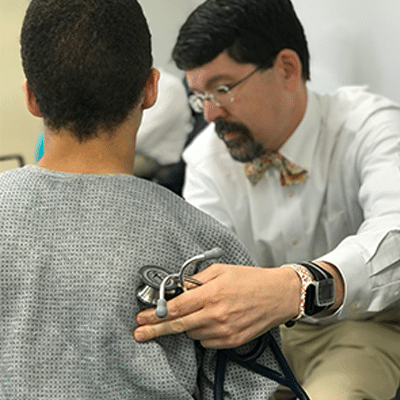
Egypt
About Egypt

Egypt has a long and rich history and is home to over 100 million people, making it the most populous nation in North Africa, the Middle East, and the Arab world.
Though Egypt has one of the largest economies in the Middle East and Africa, the country struggles with persistent unemployment and poverty. An estimated 32 million people live below the national poverty line — one-third of the total population.
The health system in Egypt struggles due to a lack of funding and a shortage of health care workers. As the population grows, so does the need for quality health services. The impact of COVID-19 has only underlined the urgency of improving access to health care.


The Challenges
The prevalence of noncommunicable diseases
Noncommunicable diseases are the leading cause of death in Egypt. Cancer, diabetes, cardiovascular diseases, and other NCDs account for 82% of all deaths.
Four key risk factors contribute to the rising threat of NCDs: the use of tobacco, the harmful use of alcohol, unhealthy diet, and insufficient physical activity.
The 2017 STEPwise survey revealed a significantly high prevalence of these risk factors among Egypt’s adult population, including a 23% prevalence of smoking.
The country has one of the most overweight and obese populations in the world. One in every three people suffers from obesity.
The burden of Gaucher disease
A rare genetic disorder, Gaucher disease causes the buildup of fatty cells in the liver and spleen, bone marrow, and nervous system. The disease occurs in up to one in 50,000 births in the general population and afflicts more people in Egypt than any other country worldwide.
Most Gaucher patients are diagnosed as children. Without care, the disease can be debilitating, and ultimately fatal. Most young Gaucher patients who don’t receive enzyme replacement therapy will not survive into adulthood.

Bringing HOPE to Egypt
Our history in Egypt
Project HOPE’s work in Egypt began in 1975 when Egyptian First Lady Jehan Sadat requested assistance with medical expertise for the Al Wafaa Wal Ama comprehensive rehabilitation center.
Throughout the 1980s and 1990s, we spearheaded several medical training initiatives to help build the nation’s health workforce. This included the development of a Master’s Degree in Nursing program at Cairo University and a curriculum for a Nursing diploma, the creation of a biomedical engineering training program, and the development of emergency medical training programs.
In 2000, Project HOPE, in partnership with Pfizer, contributed to the development and implementation of the National Training Institute in Cairo. Today, the institute provides health care professionals with the most advanced training in the region.
We continue to work closely with the Ministry of Health to strengthen Egypt’s health system by training the health workforce to be able to respond to some of the country’s most burdensome diseases.
Reducing the burden of noncommunicable diseases
Project HOPE trains and equips health workers to be able to prevent, treat, and manage noncommunicable diseases.
Throughout our time in Egypt, we have provided training and technical support around diabetes care and insulin supplies, as well as cardiovascular and cancer care (including an effort to reduce morbidity and mortality due to smoking). Project HOPE’s 5 Steps to Self-Care diabetes self-management curriculum has also been implemented in other countries in the Middle East region.
Improving care for patients with Gaucher disease
Since 1999, Project HOPE, Sanofi-Genzyme, the Egyptian Ministry of Health, and seven children’s hospitals have been working together to improve the health and well-being of those living with Gaucher disease.
We do so by providing essential medicines, health care worker education, and support to families. Together, we are strengthening the system of care so Gaucher patients can receive the highest level of treatment — raising awareness, improving diagnosis, and developing specialized clinical expertise among local medical professionals to do so.
Protecting communities against COVID-19
Project HOPE has been supporting the Ministry of Health, frontline health care workers, and communities to better detect, contain, and respond to COVID-19.
In partnership with Brown University, we delivered virtual training for Egypt’s frontline health care workers, and in partnership with the Weitzman Institute, we are providing health care workers with the opportunity to conduct e-Consults with experts in the U.S.
Learn more about Project HOPE’s ongoing response to COVID-19

Our Impact
Project HOPE has reached thousands of health care workers through the development of the National Training Institute in Cairo. By 2005, 3,400 physicians and other health care professionals had been trained in specialties including emergency medicine and trauma, infection control, family medicine, and HIV/AIDS and diabetes care and treatment.
The Gaucher Initiative has contributed to substantial improvements in the treatment of patients over the past two decades. More than 500 health care workers have received training since the start of the initiative and more than 300 patients have been enrolled over the course of the program, with 147 undergoing active treatment at seven university children’s hospitals across the country.
Read: Gaucher Initiative Saves Young Lives, Advances Treatment